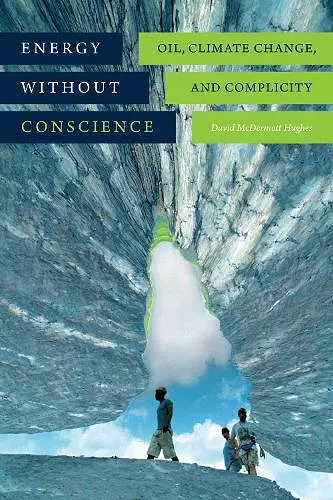Energy without Conscience
Oil, Climate Change, and Complicity
Format:Paperback
Publisher:Duke University Press
Published:17th Mar '17
Currently unavailable, currently targeted to be due back around 24th January 2025, but could change

In Energy without Conscience David McDermott Hughes investigates why climate change has yet to be seen as a moral issue. He examines the forces that render the use of fossil fuels ordinary and therefore exempt from ethical evaluation. Hughes centers his analysis on Trinidad and Tobago, which is the world's oldest petro-state, having drilled the first continuously producing oil well in 1866. Marrying historical research with interviews with Trinidadian petroleum scientists, policymakers, technicians, and managers, he draws parallels between Trinidad's eighteenth- and nineteenth-century slave labor energy economy and its contemporary oil industry. Hughes shows how both forms of energy rely upon a complicity that absolves producers and consumers from acknowledging the immoral nature of each. He passionately argues that like slavery, producing oil is a moral choice and that oil is at its most dangerous when it is accepted as an ordinary part of everyday life. Only by rejecting arguments that oil is economically, politically, and technologically necessary, and by acknowledging our complicity in an immoral system, can we stem the damage being done to the planet.
“Hughes has contributed greatly to an understanding of how climate change is viewed in locations outside of the modern Western world.” -- Sandra Moore * Anthropology Book Forum *
"Energy without Conscience is a thoughtful take on how climate change complicity can exist without a countrywide collective conscience of wrongdoing." -- Trey Murphy * Geographical Review *
"Hughes offers us a rich and important ethnographic account of Trinidad that marks the Caribbean nation not only as the site of Christopher Columbus’ third exploration to the Americas, but also as the world’s first petro- extractive geography. . . . Energy Without Conscience is a powerful and urgent book, one that furthers an understanding of global interconnectedness, not as a neoliberal project of unity, but through a web of danger, unequal outcomes, and a matrix of complicity." -- Macarena Gomez-Barris * Journal of Latin American Geography *
“Overall, Hughes’s Energy Without Conscience gives us a deeply historicized description of Trinidad and Tobago’s oil economy. Most importantly, he describes the potentiality of the past to have led to different presents and inspires us to consider different futures…. [The book] raises important questions about the ethical considerations and responsibilities of doing research in a world facing climate catastrophe. Owing to the methodical issues it covers, it will be of particular interest to anyone planning and conducting research in the broad fields of energy humanities, the anthropology of climate change, and extractive industries.” -- Kari Dahlgren * Journal of the Royal Anthropological Institute *
ISBN: 9780822362982
Dimensions: unknown
Weight: 318g
208 pages